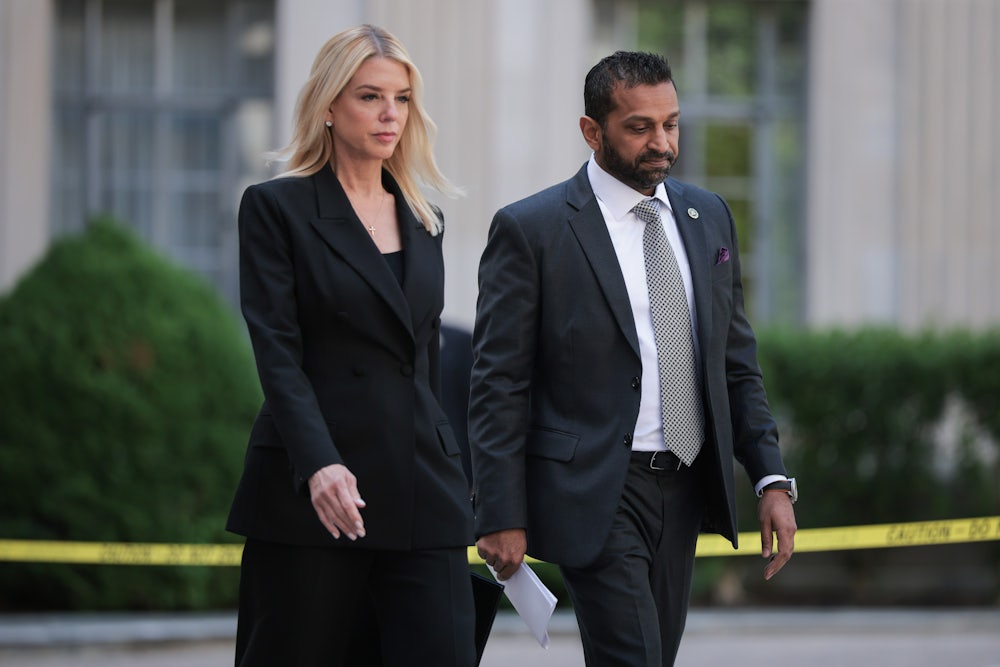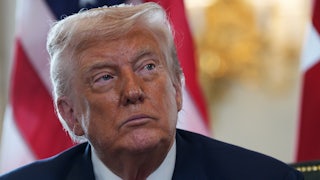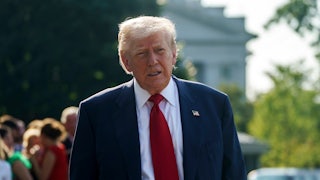Six years ago, shortly before Jeffrey Epstein died in his cell while awaiting trial on sex-trafficking charges, news broke that the FBI had issued a bulletin warning of the potential threat posed by QAnon. At the time, QAnon was not widely understood. It appeared to be a complex jumble of conspiracy theories around which communities formed on social media, communities whose members believed they could help bring about the demise of a shadowy, powerful cabal controlling the world and, among other things, trafficking children for sex. QAnon was anticipating a climactic final battle—“the storm”: a violent reckoning cribbed from far-right anti-government texts and ideology—in which the cabal would be exposed, the deep state would be toppled, and believers’ enemies would be executed.
“The FBI assesses these conspiracy theories very likely will emerge, spread, and evolve in the modern information marketplace, occasionally driving both groups and individual extremists to carry out criminal or violent acts,” the May 30, 2019, bulletin from the FBI’s Phoenix field office stated. It warned that as the 2020 election neared, QAnon could become more of a danger, intensifying in part due to “the uncovering of real conspiracies or cover-ups involving illegal, harmful, or unconstitutional activities by government officials or leading political figures.” Just a couple of months later, Trump did in fact retweet a post from an account pushing QAnon conspiracy theories, such as those about Democrats trafficking children to harvest their pineal glands. The post that Trump shared, which merely alleged that Democrats “are the only ones” to interfere in American elections, may have seemed tame compared to other QAnon posts at the time, which tended toward grotesque dreams of vengeance.
Today, six years after the FBI’s warning was made public, six years after Epstein’s death, we get jokes about how, now that Trump’s ties to Epstein are once again under scrutiny, even his onetime supporters like the QAnon Shaman—Jacob Chansley, an Arizona man made internationally famous on January 6 for his horned fur hat and bare chest, who led “rioters in [an] incantation,” per the Justice Department—have abandoned him. Some are even celebrating an apparent crack-up in MAGA, once fueled by QAnon fantasies of exposing sex traffickers, over Trump’s failure to release the “Epstein files.” Didn’t MAGA claim to care about sex traffickers operating with impunity? Doesn’t Trump now look like yet another elite operating with impunity? Trump appears to be cutting back major U.S. anti-trafficking efforts, diverting investigators to immigration enforcement—doesn’t it look an awful lot like he never cared about sex trafficking?
Well, neither MAGA nor Trump ever cared all that much about “fighting trafficking.” It was mainly an opportunity for MAGA, just as it was for QAnon: a platform for fundraising and self-promotion. For Trump, trafficking offered a ready-made law enforcement apparatus to be turned on immigrants, an excuse to build his wall. The first Trump administration also handily demolished its relationship with the largest network of human trafficking groups in the United States. As for whether MAGA’s anger at Trump means that QAnon is at last over—the conspiracy theories no longer sustainable in the face of a sex-trafficking scandal involving its hero—I am not sure that it can be. Far from fading, it feels like QAnon is everywhere now.
Years before the Epstein files came to haunt Trump, QAnon was declared “defeated,” disintegrating, or dead numerous times. Some thought Biden’s win would quiet adherents, and people pointed to the posts “from” Q drying up (but for a brief, inconsequential return in 2022). When the attempted insurrection on January 6, 2021, made it clear that QAnon was far from over, some hoped that that might be its demise, now that more people could see the violent, authoritarian reality of the movement. But far from disappearing, it went mainstream—straight into the Republican Party. In 2024, in fact, more than one-quarter of Republicans indicated some belief in QAnon.
Take Kash Patel, whose name appeared in one of the original Q drops. In 2022, he was a regular on QAnon podcasts, defending their slogan “Where we go one, we go all.” He posted a photo on Truth Social claiming to be hanging out with Q, as part of an effort to get the QAnon community to move to the site. Trump, who owned most of Truth Social, selected Patel to run the FBI. During Attorney General Pam Bondi’s confirmation hearing in January, when she was asked about QAnon, she said, “I have heard of it, but I do not know what it is.” When asked whether Kash Patel, who has said he supported much of what QAnon supports, was suited to run the FBI, Bondi did not answer. She replied, “I look forward to hearing his testimony about QAnon in this committee.” Bondi, of course, was Trump’s second choice for the job, after Matt Gaetz, who was once himself under investigation for sex trafficking. The congressional report that resulted found that Gaetz had paid a woman for sex and that he had sex with a 17-year-old, but he was not charged; had he paid the 17-year-old, or coerced the adult woman, that would meet the statutory definition of sex trafficking (which the report misstated as requiring transportation for commercial sex over state lines).
In his own confirmation hearings, Patel attempted to disavow QAnon, stating that he “rejected outright QAnon baseless conspiracy theories or any other baseless conspiracy theories.” A blow to QAnon? Hardly, as Wired reported: QAnon posters praised him. According to Wired’s survey of posts at the time on Truth Social, Telegram, Gab, 4chan, TikTok, and X, QAnon supporters saw this not as a betrayal but as a confirmation that their conspiracy theories were correct. “THERE IS NO QANON, SO KASH TOLD THE TRUTH!!” a QAnon influencer on Telegram posted. This was another conspiracy theory they had been pushing, rewriting QAnon as something their enemies in the media had invented to smear the “real” truth tellers. Another poster replied, “He basically said they are not conspiracies but rather the truth, love it.” QAnon’s conspiracy theories were elastic enough, in other words, to accommodate Patel’s leading the FBI. His confirmation wasn’t a sign that he was joining the deep state; it meant that he was now positioned to bring about its demise. The same doubled-back quality inflects some of the QAnon responses to Trump’s attempts to wave off the Epstein story. Some have attempted to explain it away as yet another attempt to take down Trump, or as a psy-op, or similar. The more these heroes of QAnon deny the movement, in other words, the nearer the storm.
Far from serving as an indicator of QAnon’s waning influence, such comments, which imply powerful government officials’ distance from QAnon, should give us pause. In 2019, it was remarkable that anyone who believed in QAnon could be elected to Congress; by 2022, not only had Marjorie Taylor Greene done it but more than 20 QAnon-friendly candidates were running. In 2019, when the FBI bulletin about the threat of QAnon was publicized, did anyone at the FBI think that threat extended to someone who might soon run their own agency? The fact that we even have to consider that question shows just how much rot and horror QAnon and its promoters have wreaked.
As much as QAnon can be defined by its guiding narratives—the secret sex-trafficking cabal, their day of reckoning—the story is always evolving. For promoters like Patel and Trump, the specifics may not matter nearly so much as their ability to tap into its deeper strains. The sex-trafficking cabal harkens back to much older antisemitic tropes; the storm is a variation on the “day of the rope” dream among far-right groups, when all those who don’t belong in their white nationalist paradise will be hanged. The through line of Trump’s campaigns and presidencies revolves around protecting (white) American children (and infantilized women) from the constant threat of monstrous sexual predators—a piece of American lore, really, that has justified everything from lynchings to mass deportations. To see America that way today is to live in QAnon’s America.
Some QAnon promoters are less visible than others, but they’re still out there: One still had hundreds of thousands of followers on Rumble in 2025; one is in the White House, and posted about QAnon multiple times this week alone. After retweeting QAnon content in 2019, Trump did so hundreds more times until he was kicked off Twitter after January 6, according to Media Matters, and amplified QAnon content on Truth Social nearly 1,000 times between joining the site in 2022 and the final weeks of his reelection campaign in 2024. It’s staggering to look back over those very recent years. Take the press conference in August 2020 when Trump said of QAnon, “I don’t know much about the movement other than I understand they like me very much, which I appreciate.” Maybe that didn’t seem all that different from anything else Trump said at the time. (“Is QAnon taking over America? Not so fast,” a Guardian op-ed that week chimed in.) Maybe his comment seems like nothing now, compared to what followed. Maybe we’ve just gotten used to it.






